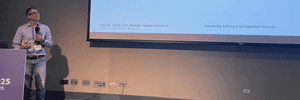Hello, Merry Christmas and Happy Holidays! I just completed Advent of Code 2023, and wanted to jot down a few reflections before I disappear for the holidays. Like last year, I chose to implement my solutions using Rust.
Rust: easier with practice, but still a bit in the way
The good news is that I ran into far fewer problems with Rust this year. There
are a few reasons for this, but a lot of it just boils down to experience. I
tend to program excessively using lazy iterators, and I began to get a second
sense for when I'd need to call .collect() to avoid referencing a freed
temporary value. Similarly, when I would get a compiler error (and yes, this
still happens a lot!), I would often immediately know how to fix the problem.
That being said, there were still occasions when the language just "got in the
way". I had a few solutions where I had to throw in copious amounts of
.clone() calls. One salient example was on day
22
when I wanted to memoize a subproblem. But to do so, I also had to pass a value
instead of a reference to each sub-problem, which slowed things down
dramatically. Anyway, with more work, the solution probably would have been to
use references with lifetimes and just ensure that memoization happened during
the right lifetimes. But the key phrase there is with more work. And see
below
-- I was already pretty frustrated.
Chat-GPT and Co-pilot
On this year's Advent of Code, I used Chat-GPT and Co-pilot quite heavily, as I do in practice when coding. I used Chat-GPT mostly to avoid looking up documentation or crates. For example, "How can I add a progress indicator to an iterator in Rust?" or "How can I bind a sub-pattern to a name in Rust?". Given that I hadn't programmed in Rust for a year, I was a bit rusty (ha!)
Co-pilot was also quite useful. It was pretty good at writing out boilerplate code. Advent of Code problems tend to include copious amounts of grid problems, and Co-pilot reduced a lot of the fatigue for helper functions. Define things for the X axis, and it would figure out how to implement the other cases.
I also found that Co-pilot was able to explain weird Rust borrowing problems far
better than the compiler. As I wrote about last year, Rust's borrowing rules
sometimes don't work that great for my programming style, but Co-pilot was
pretty good about explaining problems. I don't have a specific example, but
think of searching a vector using vec.iter(), using the found value at some
point, and then later trying to move the vector. In my opinion, this definitely
makes it easier to program in Rust.
Now, Co-pilot did introduce some headaches as well. Although it was pretty
good, it would sometimes introduce problematic completions. For instance, it
really liked to complete print statements by adding an extra quote, e.g.,
println!("This is something: {:?}", something"); Not a huge deal, but it
happened enough that it was irritating.
Frustration and Clear-headedness: The Fine Line Between Perseverance and Stubbornness
On some level, I think everyone knows this, but it's still worth saying: You are more effective when thinking clearly. I recall from graduate school that many of my fellow students would pull all nighters and submit papers in the wee hours of the morning. I never did that. My efficiency just plummets as I get tired.
I experienced a pretty funny (in retrospect) example of this on day 22. You can read the problem, it's not really that hard. One of the nice things about programming functionally is that it usually works or completely fails. There's not a lot of in-between. In Advent of Code, this means that if your solution works on the example, it usually works on the real input (ignoring performance). But on day 22, my code did not work on the real input. The problem is pretty simple, so it was infuriating. Rather than taking a break to clear my head, I just kept trying to debug it. I stayed up far past my bed time, becoming more and more frustrated. I even completely rewrote my implementation in Python before giving up and going to bed.
The next morning, I woke up and looked at the problem again. I had a simple idea. I actually had two solutions to the problem. I had a simple but slow solution that I was confident was correct, but was too slow to use on the real input. And I had my fast solution that I thought should be correct, but wasn't. My insight was that I could make "in between" problems by just taking a portion of the real input -- say 10%. And then see if my fast solution agreed with the slow one. It didn't. I then ran Lithium and reduced the input to a minimal example. From here, it was trivial to spot the fundamental problem I had in my recursive algorithm. I fixed it, and my solution worked. This whole process probably only took 30 minutes from the time I woke up. I futilely spent hours the previous night. And the worst part is that, even in the moment, I knew I was acting foolishly. I was just too frustrated to stop.
I don't know if this is universal, but when I am stressed or frustrated, I usually make mistakes, which naturally compound my stress and frustration! There is a fine line between perseverance and stubbornness, and I crossed it on day 22.
Powered with by Gatsby 5.0

